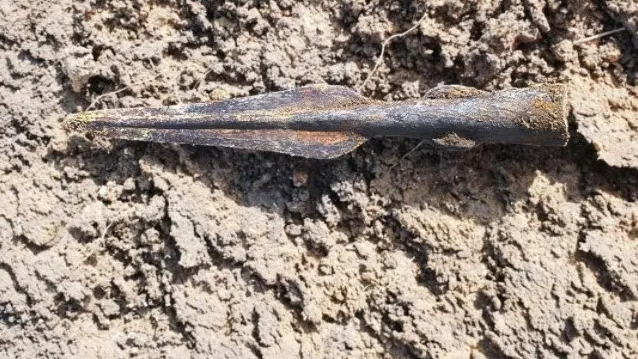A near-pristine Bronze Age spearhead was among the historic artefacts uncovered during work to build new wetlands at a Thames Water sewage works in Cirencester.
The spearhead, which is more than 3,000 years old, was discovered just a few feet under the ground at the works in South Cerney earlier this year during excavation works as part of the project to create the new wildlife habitat.
Other finds included pottery and animal bones, along with evidence of tracks and dwellings from the Bronze Age, Iron Age and Roman periods. Thames Water worked alongside Cotswold Archaeology on the project in order to protect the ancient items, which are now being examined and catalogued at the group’s base in Cirencester and could then be displayed at the town’s Corinium Museum.
Thames Water archaeologist Victoria Reeve said: “We’re thrilled to have uncovered such interesting finds during our work at the site, including the spearhead which we believe to be thousands of years old and is still in great condition.
“We knew we were likely to come across something interesting while carrying out the work, which is why we had Cotswold Archaeology on site ready to record any archaeology that was present, but we were blown away by what we actually discovered.”
Becky Elliott, Thames Water’s biodiversity manager, who led the project, added: “We’re still working on the wetlands and hope to complete it in the coming months. At Thames Water we’re dedicated to supporting nature recovery across all our sites and providing better condition habitats with greater connectivity in which all kinds of wildlife can flourish.”
Alex Thomson, Cotswold Archaeology’s Project Manager, added: “On the first day we were here, on almost the first machine scrape, this beautiful spearhead popped out of the top of a Bronze Age pit. They’re very rare to find, very special artefacts.
“We knew the site had archaeological potential but we didn’t quite expect the extent of what we uncovered. It’s always exciting as you never know what you’re going to find – it could be absolutely nothing or, as in this instance, you could find more than you bargained for.”
The new wetlands will cover about four hectares of floodplain on the south of the site, providing a valuable habitat for a range of wildlife including amphibians, insects and wading and migratory birds. Thames Water has committed to increasing biodiversity by 5% across more than 250 of its sites by 2025.
As well as creating brand new habitats such as wetlands, woodlands and hedgerows, the water company is committed to improving the condition of existing habitats through changes in grassland management. The area of land to be improved by the programme is around 4,000 hectares – two-and-a-half times the size of Heathrow Airport.
The spearhead was the latest in a string of interesting archaeological finds uncovered by Thames Water in recent years. In 2019, the water company discovered 26 human skeletons, thought to be about 3,000 years old, during a £14.5m water pipe scheme in Oxfordshire.
Cotswold Archaeology also excavated that site and believed that some of the remains, thought to be from the Iron Age and Roman periods, may have been from ritual burials.



